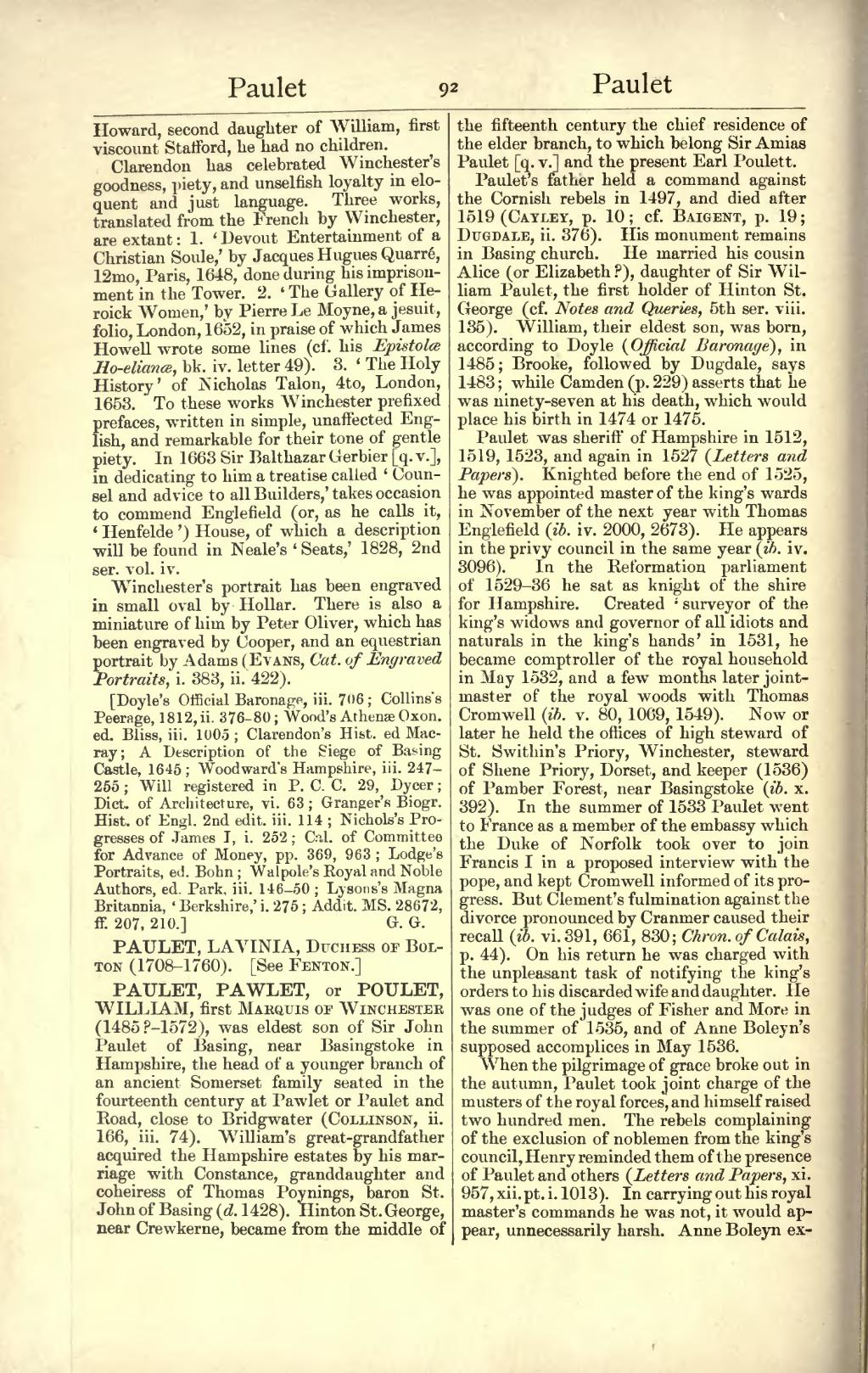Howard, second daughter of William, first viscount Stafford, he had no children.
Clarendon has celebrated Winchester's goodness, piety, and unselfish loyalty in eloquent and just language. Three works, translated from the French by Winchester, are extant: 1. ‘Devout Entertainment of a Christian Soule,’ by Jacques Hugues Quarré, 12mo, Paris, 1648, done during his imprisonment in the Tower. 2. ‘The Gallery of Heroick Women,’ by Pierre Le Moyne, a jesuit, folio, London, 1652, in praise of which James Howell wrote some lines (cf. his Epistolæ Ho-elianæ, bk. iv. letter 49). 3. ‘The Holy History’ of Nicholas Talon, 4to, London, 1653. To these works Winchester prefixed prefaces, written in simple, unaffected English, and remarkable for their tone of gentle piety. In 1663 Sir Balthazar Gerbier [q. v.], in dedicating to him a treatise called ‘Counsel and advice to all Builders,’ takes occasion to commend Englefield (or, as he calls it, ‘Henfelde’) House, of which a description will be found in Neale's ‘Seats,’ 1828, 2nd ser. vol. iv.
Winchester's portrait has been engraved in small oval by Hollar. There is also a miniature of him by Peter Oliver, which has been engraved by Cooper, and an equestrian portrait by Adams (Evans, Cat. of Engraved Portraits, i. 383, ii. 422).
[Doyle's Official Baronage, iii. 706; Collins's Peerage, 1812, ii. 376–80; Wood's Athenæ Oxon. ed. Bliss, iii. 1005; Clarendon's Hist. ed Macray; A Description of the Siege of Basing Castle, 1645; Woodward's Hampshire, iii. 247–255; Will registered in P. C. C. 29, Dycer; Dict. of Architecture, vi. 63; Granger's Biogr. Hist. of Engl. 2nd edit. iii. 114; Nichols's Progresses of James I, i. 252; Cal. of Committee for Advance of Money, pp. 369, 963; Lodge's Portraits, ed. Bohn; Walpole's Royal and Noble Authors, ed. Park, iii. 146–50; Lysons's Magna Britannia, ‘Berkshire,’ i. 275; Addit. MS. 28672, ff. 207, 210.]
PAULET, LAVINIA, Duchess of Bolton (1708-1760). [See Fenton.]
PAULET, PAWLET, or POULET, WILLIAM, first Marquis of Winchester (1485?–1572), was eldest son of Sir John Paulet of Basing, near Basingstoke in Hampshire, the head of a younger branch of an ancient Somerset family seated in the fourteenth century at Pawlet or Paulet and Road, close to Bridgwater (Collinson, ii. 166, iii. 74). William's great-grandfather acquired the Hampshire estates by his marriage with Constance, granddaughter and coheiress of Thomas Poynings, baron St. John of Basing (d. 1428). Hinton St. George, near Crewkerne, became from the middle of the fifteenth century the chief residence of the elder branch, to which belong Sir Amias Paulet [q. v.] and the present Earl Poulett.
Paulet's father held a command against the Cornish rebels in 1497, and died after 1519 (Cayley, p. 10; cf. Baigent, p. 19; Dugdale, ii. 376). His monument remains in Basing church. He married his cousin Alice (or Elizabeth ?), daughter of Sir William Paulet, the first holder of Hinton St. George (cf. Notes and Queries, 5th ser. viii. 135). William, their eldest son, was born, according to Doyle (Official Baronage), in 1485; Brooke, followed by Dugdale, says 1483; while Camden (p. 229) asserts that he was ninety-seven at his death, which would place his birth in 1474 or 1475.
Paulet was sheriff of Hampshire in 1512, 1519, 1523, and again in 1527 (Letters and Papers). Knighted before the end of 1525, he was appointed master of the king's wards in November of the next year with Thomas Englefield (ib. iv. 2000, 2673). He appears in the privy council in the same year (ib. iv. 3096). In the Reformation parliament of 1529–36 he sat as knight of the shire for Hampshire. Created ‘surveyor of the king's widows and governor of all idiots and naturals in the king's hands’ in 1531, he became comptroller of the royal household in May 1532, and a few months later joint-master of the royal woods with Thomas Cromwell (ib. v. 80, 1069, 1549). Now or later he held the offices of high steward of St. Swithin's Priory, Winchester, steward of Shene Priory, Dorset, and keeper (1536) of Pamber Forest, near Basingstoke (ib. x. 392). In the summer of 1533 Paulet went to France as a member of the embassy which the Duke of Norfolk took over to join Francis I in a proposed interview with the pope, and kept Cromwell informed of its progress. But Clement's fulmination against the divorce pronounced by Cranmer caused their recall (ib. vi. 391, 661, 830; Chron. of Calais, p. 44). On his return he was charged with the unpleasant task of notifying the king's orders to his discarded wife and daughter. He was one of the judges of Fisher and More in the summer of 1535, and of Anne Boleyn's supposed accomplices in May 1536.
When the pilgrimage of grace broke out in the autumn, Paulet took joint charge of the musters of the royal forces, and himself raised two hundred men. The rebels complaining of the exclusion of noblemen from the king's council, Henry reminded them of the presence of Paulet and others (Letters and Papers, xi. 957, xii. pt. i. 1013). In carrying out his royal master's commands he was not, it would appear, unnecessarily harsh. Anne Boleyn ex-
